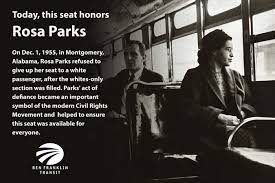
Rosa Parks was a civil rights activist who refused to surrender her seat to a white passenger on a segregated bus in Montgomery, Alabama in 1955. Her defiance sparked the Montgomery Bus Boycott; its success launched nationwide efforts to end racial segregation of public facilities.
On December 1, 1955, Parks was arrested for refusing a bus driver’s instructions to give up her seat to a white passenger. She later recalled that her refusal wasn’t because she was physically tired, but that she was tired of giving in. After a long day’s work at a Montgomery department store, where she worked as a seamstress, Parks boarded the Cleveland Avenue bus for home. She took a seat in the first of several rows designated for “coloured” passengers.
As the bus Parks was riding continued on its route, it began to fill with white passengers. Eventually, the bus was full and the driver noticed that several white passengers were standing in the aisle. The bus driver stopped the bus and moved the sign separating the two sections back one row, asking four black passengers to give up their seats.
The city’s bus ordinance didn’t specifically give drivers the authority to demand a passenger to give up a seat to anyone, regardless of colour. However, Montgomery bus drivers had adopted the custom of moving back the sign separating black and white passengers and, if necessary, asking black passengers give up their seats to white passengers. If the black passenger protested, the bus driver had the authority to refuse service and could call the police to have them removed.
Three of the other black passengers on the bus complied with the driver, but Parks refused and remained seated. The driver demanded, “Why don’t you stand up?” to which Parks replied, “I don’t think I should have to stand up.” The driver called the police and had her arrested.
The police arrested Parks at the scene and charged her with violation of Chapter 6, Section 11, of the Montgomery City Code. She was taken to police headquarters, where, later that night, she was released on bail.
Members of the African-American community were asked to stay off city buses on Monday, December 5, 1955 – the day of Parks’ trial – in protest of her arrest. People were encouraged to stay home from work or school, take a cab or walk to work.
The Montgomery Bus Boycott, as it came to be known, was a huge success, lasting for 381 days and ending with a Supreme Court ruling declaring segregation on public transit systems to be unconstitutional.
In 1987, with longtime friend Elaine Eason Steele, Parks founded the Parks and Raymond Parks Institute for Self-Development. The organization runs “Pathways to Freedom” bus tours, introducing young people to important civil rights and Underground Railroad sites throughout the country.
Rosa was awarded the Martin Luther King Jr. Award by the National Association for the Advancement of Colored People, the Presidential Medal of Freedom and the Congressional Gold Medal. The United States Congress has called her “the first lady of civil rights” and “the mother of the freedom movement”.

